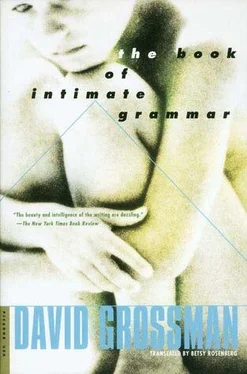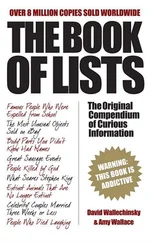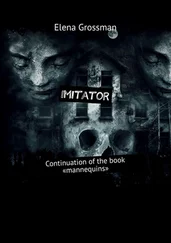David Grossman - The Book of Intimate Grammar
Здесь есть возможность читать онлайн «David Grossman - The Book of Intimate Grammar» весь текст электронной книги совершенно бесплатно (целиком полную версию без сокращений). В некоторых случаях можно слушать аудио, скачать через торрент в формате fb2 и присутствует краткое содержание. Год выпуска: 2002, ISBN: 2002, Издательство: Picador, Жанр: Современная проза, на английском языке. Описание произведения, (предисловие) а так же отзывы посетителей доступны на портале библиотеки ЛибКат.
- Название:The Book of Intimate Grammar
- Автор:
- Издательство:Picador
- Жанр:
- Год:2002
- ISBN:9781466803749
- Рейтинг книги:3 / 5. Голосов: 1
-
Избранное:Добавить в избранное
- Отзывы:
-
Ваша оценка:
- 60
- 1
- 2
- 3
- 4
- 5
The Book of Intimate Grammar: краткое содержание, описание и аннотация
Предлагаем к чтению аннотацию, описание, краткое содержание или предисловие (зависит от того, что написал сам автор книги «The Book of Intimate Grammar»). Если вы не нашли необходимую информацию о книге — напишите в комментариях, мы постараемся отыскать её.
The Book of Intimate Grammar — читать онлайн бесплатно полную книгу (весь текст) целиком
Ниже представлен текст книги, разбитый по страницам. Система сохранения места последней прочитанной страницы, позволяет с удобством читать онлайн бесплатно книгу «The Book of Intimate Grammar», без необходимости каждый раз заново искать на чём Вы остановились. Поставьте закладку, и сможете в любой момент перейти на страницу, на которой закончили чтение.
Интервал:
Закладка:
In the evening when Mama went out to the Romanian pharmacy to buy Grandma her medicines, Aron sneaked down to the furnace room and got the fancy dress and the high-heeled shoes and the bathing suit and the thick braid and all the other stuff. Cautiously he walked up to Grandma, who was sitting rigidly on her bed. He smiled at her and displayed his heavily laden arms. There were no sparks of recognition. He kneeled with effort and put the shoes on her twisted feet, and the hairbands on her head, like seven rainbows shining after a storm. She didn’t budge. She let him do what he wanted. Then he stood her up, and with great difficulty pulled the dress on over her robe. Why, he didn’t know, he only knew it had to be done and that Yochi would be proud of him. And then he went back to his room and lay down on his bed. At ten past seven Mama returned from the pharmacy and walked into Grandma’s alcove. Aron heard Mama give a frightened yelp, and after that she locked herself in her room, switched the light off, and didn’t come out till morning.
That evening there was no supper.
For three days more, three hours a day, Mama sat in the torn and dusty armchair at Edna Bloom’s. Still, she wouldn’t speak an unnecessary word to Papa, but at least she behaved respectfully toward himand also a little fearfully, as though watching the slow, awesome fall of a giant tree. Wearily he raised the little tile hammer, and there were long spells when he sat motionless on the broken floor, trying to remember why he had come here in the first place. And then Mama would look up from her knitting and stare at him in silence, not even daring to rouse him with a snort. At night, as he lay sleeping on the Gandhi mattress in the salon, he would groan so deeply he made the milk curdle, and Mama had to let his clothes out day after day to accommodate his expanding musculature; she slit his sleeves and sewed large strips of cloth into his trousers, but to no avail.
And then one day there were no more pinones in the rice, and Mama slackened her knitting. Edna served the dinner tray and stood abjectly by. And the following afternoon there was a chicken wing on the plate instead of butter-soft tongue of veal. Papa finished eating and picked his teeth as usual, only this time he neglected to cover his mouth and a feeble belch escaped it, tarnishing Edna’s face an ashen gray. Maybe that was the moment a voice whispered to her that she’d been fooled. That in some mysterious way, by some twisted conjugal logic, husband and wife had both been using her to reinforce their bonds. That all unconsciously, perhaps, they had sacrificed her to their union. Edna gave a short, fainthearted laugh. Mama and Papa examined her together.
The day after, it was a Thursday, Papa looked up from a meager drumstick and gazed reflectively into Mama’s eyes. Mama returned the gaze, reading what she read therein. When Edna left to get the dessert — for two days now this had consisted of watery peaches from a can — Mama said to Papa, “I’ll go home now, Moshe, for the thorough cleaning.” Just like that; and she walked away.
Papa waited for Edna Bloom. He stood up and wandered around the ruins till she returned, absently kicking the broken bricks, stamping lightly on the dust heaps. The first green leaves were budding on the plane tree in the yard. The warm sun tickled the most intimate corners of the afternoon. Aron stood on the sidewalk, looking thin and bowed from the back, his feet spread ridiculously wide as he gazed out at the valley. A sudden pain shot through Papa’s heart. Like a splinter from a nightmare piercing his memory in the middle of the day: he remembered his movements as he demolished the first wall. The unearthly winter he had drifted through alone for so long. He tried to recall whatit was he had been looking for, and shrugged his shoulders in disillusionment, in helpless grief; what else could he do.
Edna returned from the kitchen and her eyes sought Mama. Her face lit up for an instant, till she realized it was a sign of her final defeat. Papa took the plate from her hand and their fingers touched. Nothing happened. Except that Edna turned to stone. She felt it in her feet first, then her knees, and her thighs, and then the slow petrifaction of her sapless pubic mound. She had just enough time to imagine Mr. Kleinfeld digging her out of the marble that formed over her childless breasts, but by then there was so much stone in her heart and on her lips, and in her brain, that she didn’t hear him explaining, calmly and rationally, This has been dragging on too long, Miss Bloom, it’s too complicated, I never expected this, and I won’t take money for the floor in the hallway, it was a great honor to make your acquaintance, but now I have to go.
25
 The bathroom door flew open, and everyone listened. A moment’s silence, and then the hoarse and languorous voice said, “Achh, a mechayeh, that was good.”
The bathroom door flew open, and everyone listened. A moment’s silence, and then the hoarse and languorous voice said, “Achh, a mechayeh, that was good.”
Ruddy and shining and fragrant with soap, Papa shuffled into the salon and lay facedown on the Bordeaux, bare-chested, with a towel around his waist. Mama waited in the bedroom, clasping her hands in front of the mirror. She took a deep breath to brace herself and muttered good riddance. Then she sent Yochi to bring Mamchu in to help, and went to get the massage lotion in the bathroom.
Aron finds it difficult to concentrate on peeling the potatoes. One by one he picks them up and weighs them in his hand. They all have different faces, weird human-looking faces, but distorted and miserable, and sometimes when the knife cuts into them, he can actually feel them wince. Slowly he starts Aroning. But Papa’s groans from the salon penetrate even there. And it isn’t easy to practice these days. Oh please, let him never lose the gift. The trouble is, there’s no room left inside him. He’s utterly stuffed. His eyes are bulging, his lungs are drowning in mush. His breath stinks of it. His thoughts are smeared with it. It’s heavy as lead, it burns, it’s nauseating. And him in there with his moaning and groaning, achhhh, achhhh. It’s been a long time since we heard the like of those. Aron tries with all his might to seal himself off from the noise. Seated in the kitchen he can see Papa’s hand dangling from the sofa, with the thick, hairy fingers, tsss tsss tsss goes the chirringin his head, addressing him in the pinchy voice, through the mouthpiece of the gland: Watch it, your fingers are limp, soon they’ll spread and you’ll drop the knife. Aron pouts with concentration and quickly cuts. The little red peeler, runt of her kitchen knives, comes menacingly close to his fingers now, and he loses half the potato for a change. They’re all turning out like pygmies today. Tsss tsss tsss, why must you be so stubborn. Why are you fighting me. You don’t stand a chance. Because everything in the world is me. There’s nothing in the world that isn’t me. I’m the things of the world and the people who use them. I’m steel and rubber and wood and flesh. I’m cranks and valves and gears and pistons. I’m the blade that cuts. I’m the screws you have to remember which way to screw in on the first try. I’m the knots in your shoelaces and the cord for the blinds. Yes, I’m everything, a coded message, a secret experiment. Aron veers angrily away from the little red knife, which has suddenly started bobbing around with a life of its own. He focuses his gaze far away from here, on the fingers in the salon, for instance, and it’s a good thing Papa’s nostrils are big enough. Mama opens her mouth to alert Yochi and Grandma about a big one hiding slyly in a tangle of hair on Papa’s shoulder. And I am the scourge of the broken plate and the light bulb exploding in your hand and the glass that shatters when you clink l’chaim. And the sweater you put on inside out. And the buttons you button wrong. And the door you slam on your finger. This runt keeps trying to cut him, without even bothering to hide it. He pauses a minute and looks down at his hands, the pink little hands that always reminded him somehow of an inner organ exposed to view. He used to play the guitar once. But it broke, oh sure, uh-huh, and Yochi bought him a new one, but he can’t bring himself to take it out of the case. Just give it a try, why don’t you, see what’s left in your hands and your feelings. Once they promised him that when he was older he could take guitar lessons with a real teacher. Then they said he didn’t have talent. A Mozart you’re not, said Mama, and she smiled for some reason. So what was he? What was he? The wunderkind has lost his wunder. Because he used to have such a knack for things. Once he even fixed the toaster Mama wanted to throw out. And Papa used to let him pour the kiddush wine on Friday nights, but now his hand trembles and everything spills. He reflects about this with an eighth of a thought, as though skating on very thin ice. He knows his mind plays tricks on him and uses him against himself. It locks him in. Lockby lock. If only he could remember how he used to do things, without even thinking.
Читать дальшеИнтервал:
Закладка:
Похожие книги на «The Book of Intimate Grammar»
Представляем Вашему вниманию похожие книги на «The Book of Intimate Grammar» списком для выбора. Мы отобрали схожую по названию и смыслу литературу в надежде предоставить читателям больше вариантов отыскать новые, интересные, ещё непрочитанные произведения.
Обсуждение, отзывы о книге «The Book of Intimate Grammar» и просто собственные мнения читателей. Оставьте ваши комментарии, напишите, что Вы думаете о произведении, его смысле или главных героях. Укажите что конкретно понравилось, а что нет, и почему Вы так считаете.












